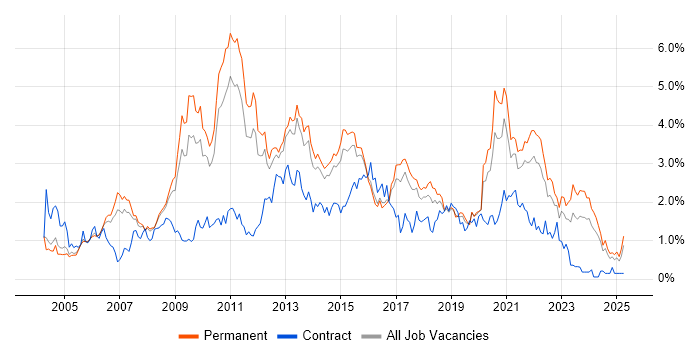Transact-SQL
West Midlands > Birmingham
The table below provides summary statistics and salary benchmarking for jobs advertised in Birmingham requiring T-SQL skills. It covers permanent job vacancies from the 6 months leading up to 11 January 2026, with comparisons to the same periods in the previous two years.
| 6 months to 11 Jan 2026 |
Same period 2025 | Same period 2024 | |
|---|---|---|---|
| Rank | 98 | 115 | 71 |
| Rank change year-on-year | +17 | -44 | +33 |
| Permanent jobs citing T-SQL | 8 | 18 | 33 |
| As % of all permanent jobs in Birmingham | 0.46% | 1.00% | 2.44% |
| As % of the Programming Languages category | 2.22% | 3.20% | 7.47% |
| Number of salaries quoted | 8 | 3 | 30 |
| 10th Percentile | £60,975 | £51,250 | £44,750 |
| 25th Percentile | £64,500 | £55,000 | £47,500 |
| Median annual salary (50th Percentile) | £65,500 | £62,500 | £57,500 |
| Median % change year-on-year | +4.80% | +8.70% | +21.05% |
| 75th Percentile | £68,750 | £73,750 | £63,750 |
| 90th Percentile | £68,825 | £79,750 | £63,875 |
| West Midlands median annual salary | £45,000 | £43,000 | £55,000 |
| % change year-on-year | +4.65% | -21.82% | +11.96% |
All Programming Languages
Birmingham
T-SQL falls under the Programming Languages category. For comparison with the information above, the following table provides summary statistics for all permanent job vacancies requiring coding skills in Birmingham.
| Permanent vacancies with a requirement for coding skills | 360 | 563 | 442 |
| As % of all permanent jobs advertised in Birmingham | 20.86% | 31.12% | 32.64% |
| Number of salaries quoted | 301 | 252 | 410 |
| 10th Percentile | £28,250 | £34,075 | £35,000 |
| 25th Percentile | £42,000 | £41,000 | £43,188 |
| Median annual salary (50th Percentile) | £60,000 | £55,000 | £55,000 |
| Median % change year-on-year | +9.09% | - | -8.33% |
| 75th Percentile | £70,000 | £70,000 | £67,250 |
| 90th Percentile | £80,000 | £77,500 | £80,000 |
| West Midlands median annual salary | £55,000 | £54,344 | £52,500 |
| % change year-on-year | +1.21% | +3.51% | -4.55% |
T-SQL
Job Vacancy Trend in Birmingham
Historical trend showing the proportion of permanent IT job postings citing T-SQL relative to all permanent IT jobs advertised in Birmingham.

T-SQL
Salary Trend in Birmingham
Salary distribution trend for jobs in Birmingham citing T-SQL.

T-SQL
Co-Occurring Skills & Capabilities in Birmingham by Category
The following tables expand on the one above by listing co-occurrences grouped by category. They cover the same employment type, locality and period, with up to 20 co-occurrences shown in each category:
